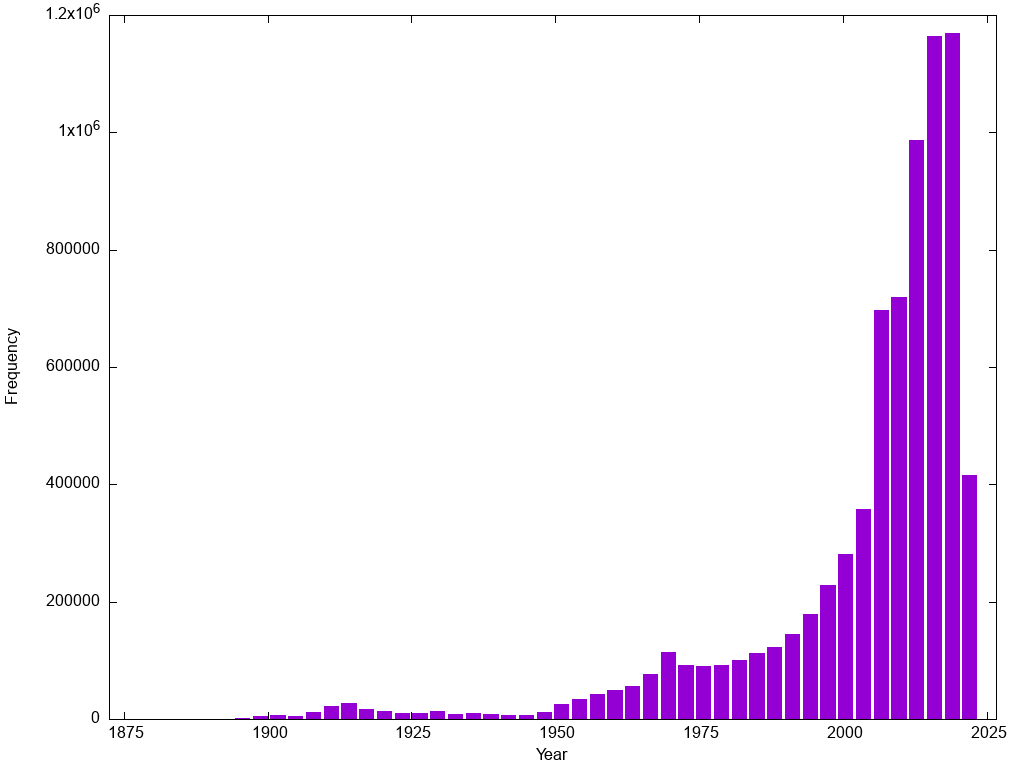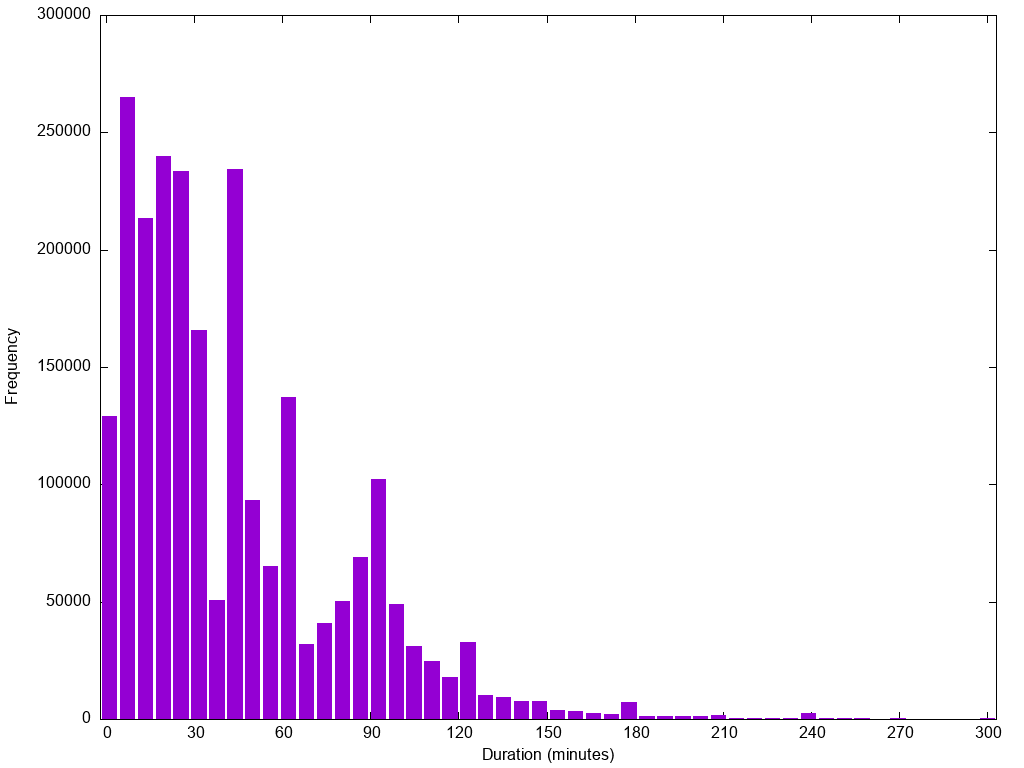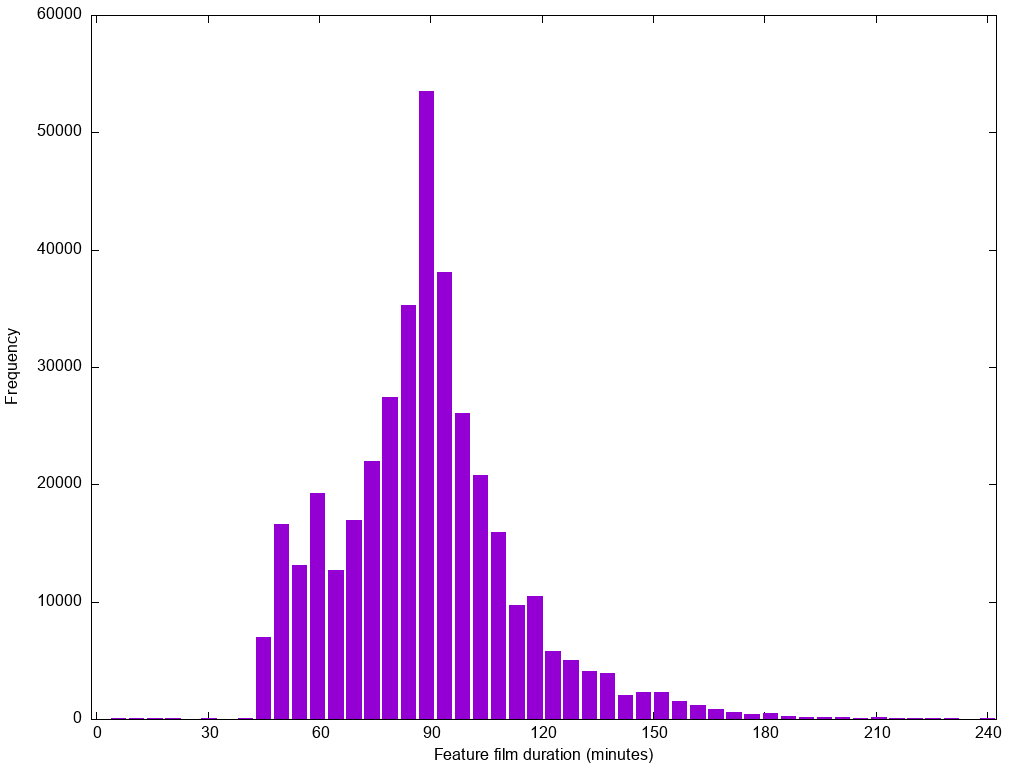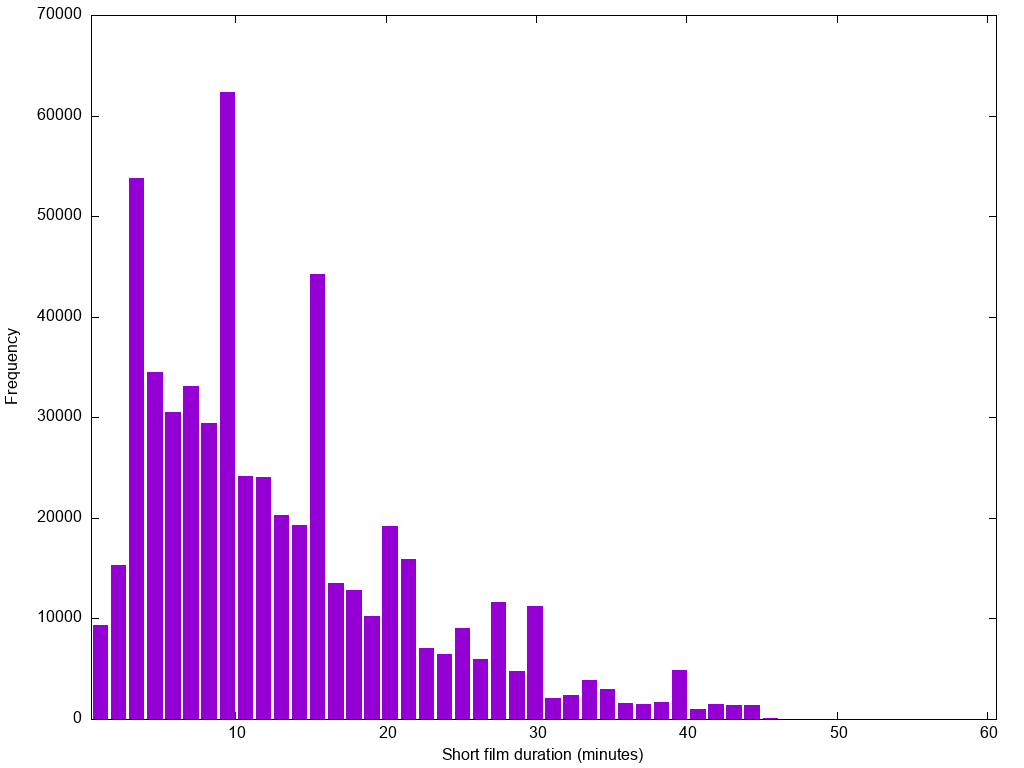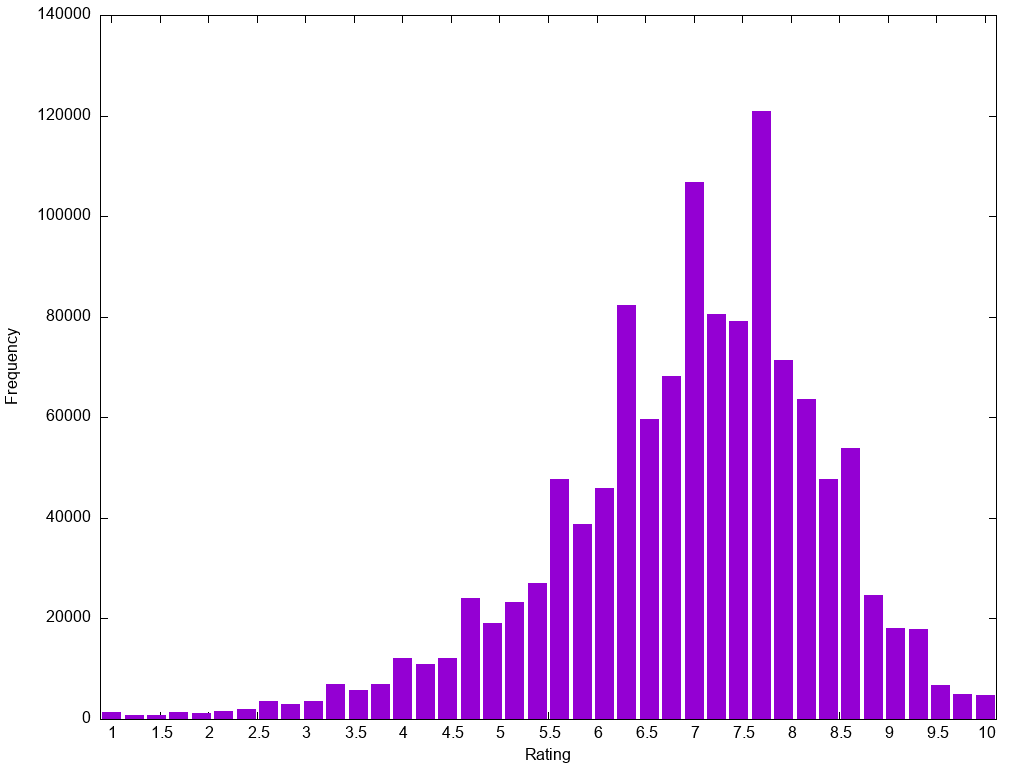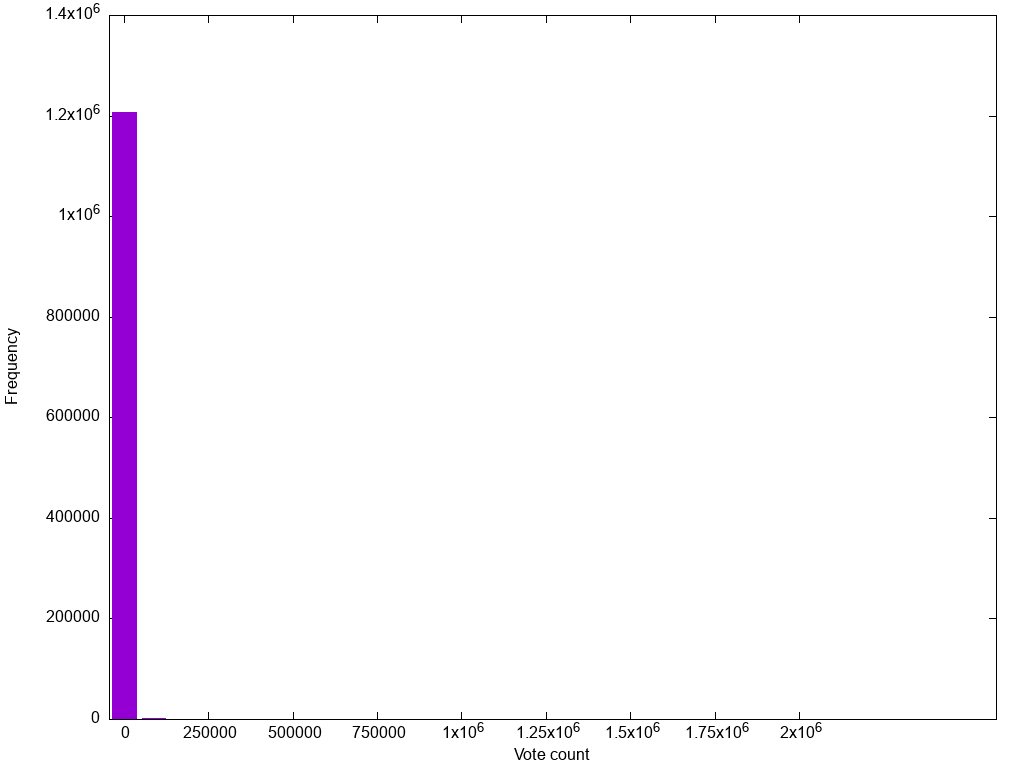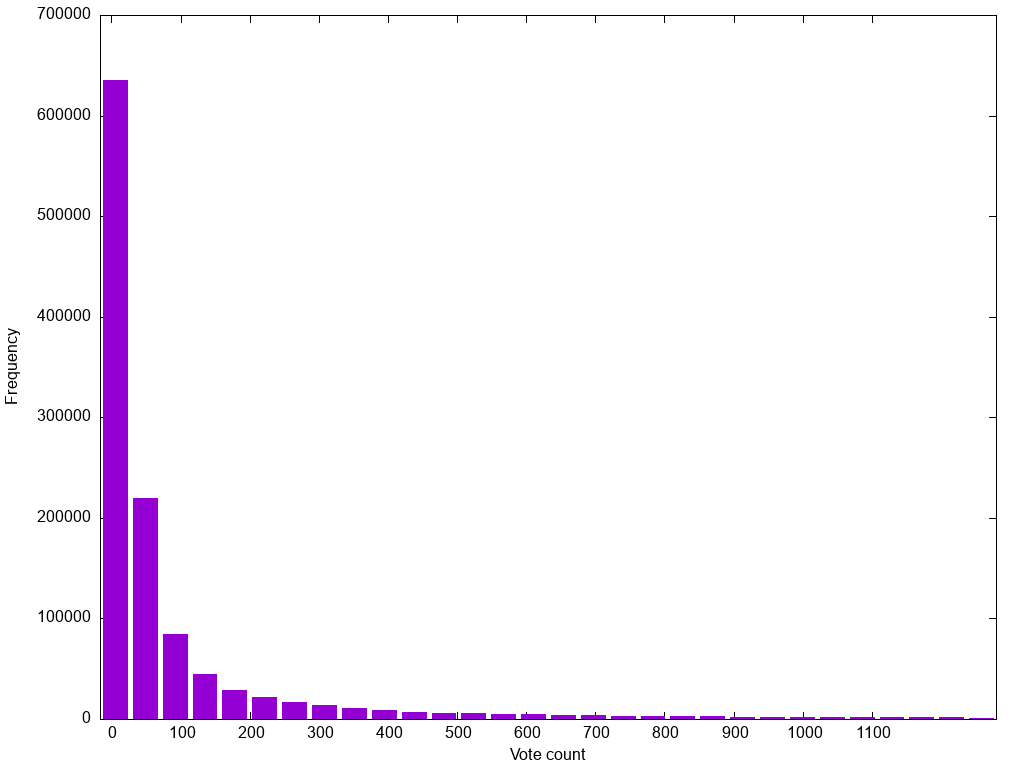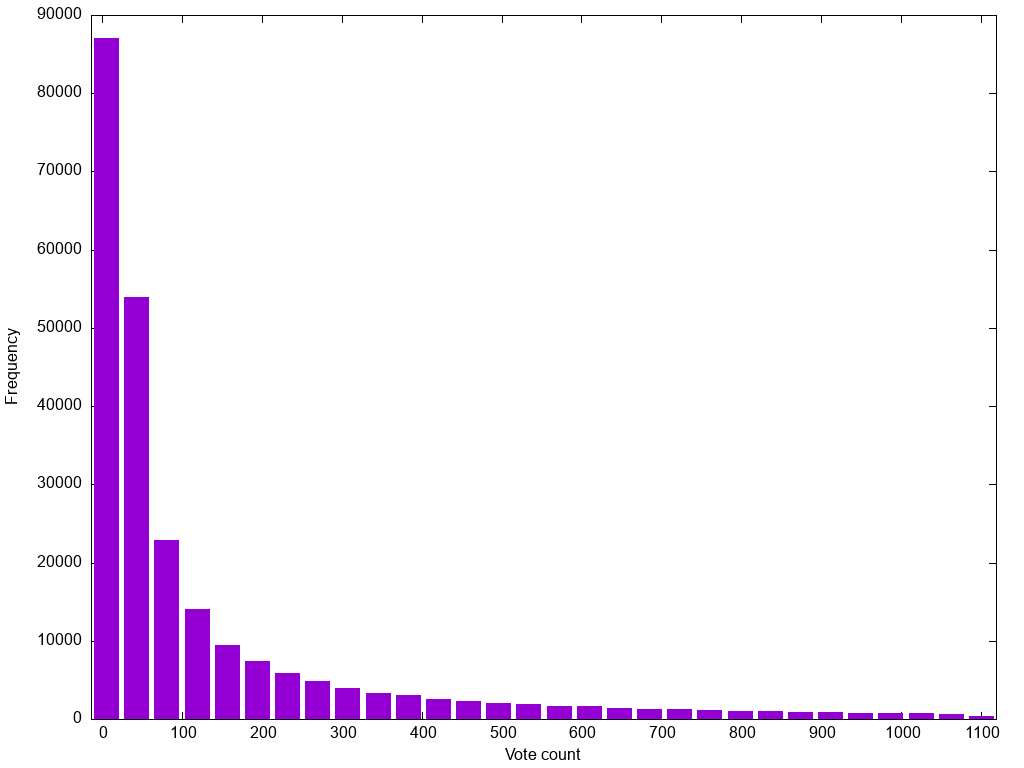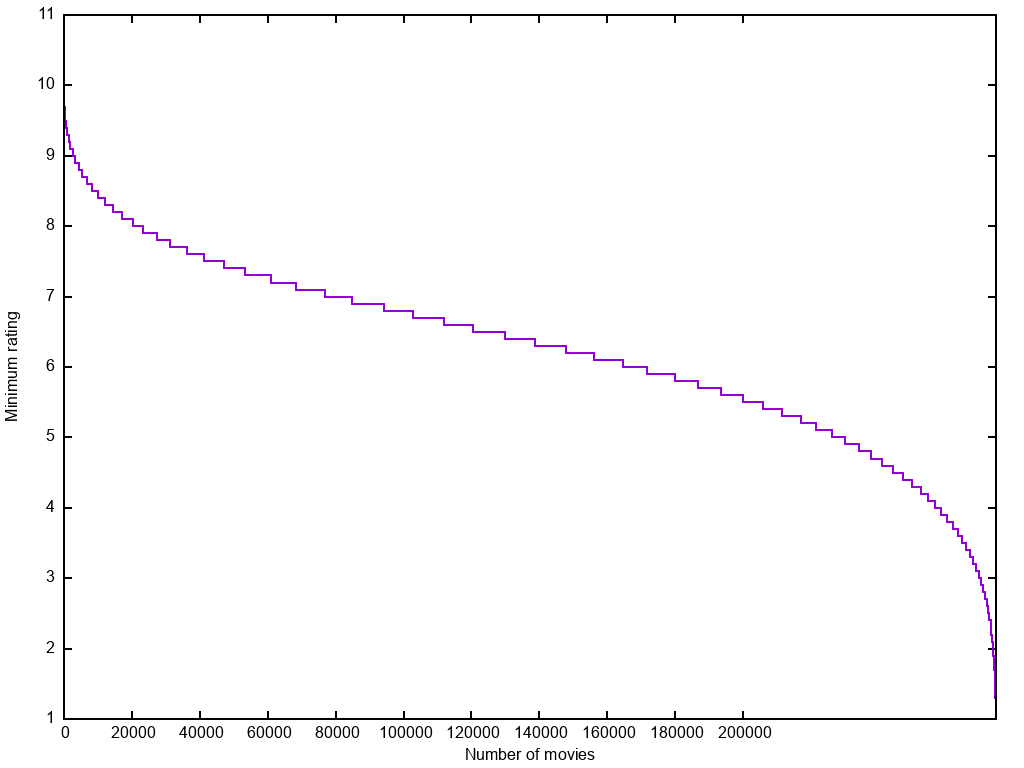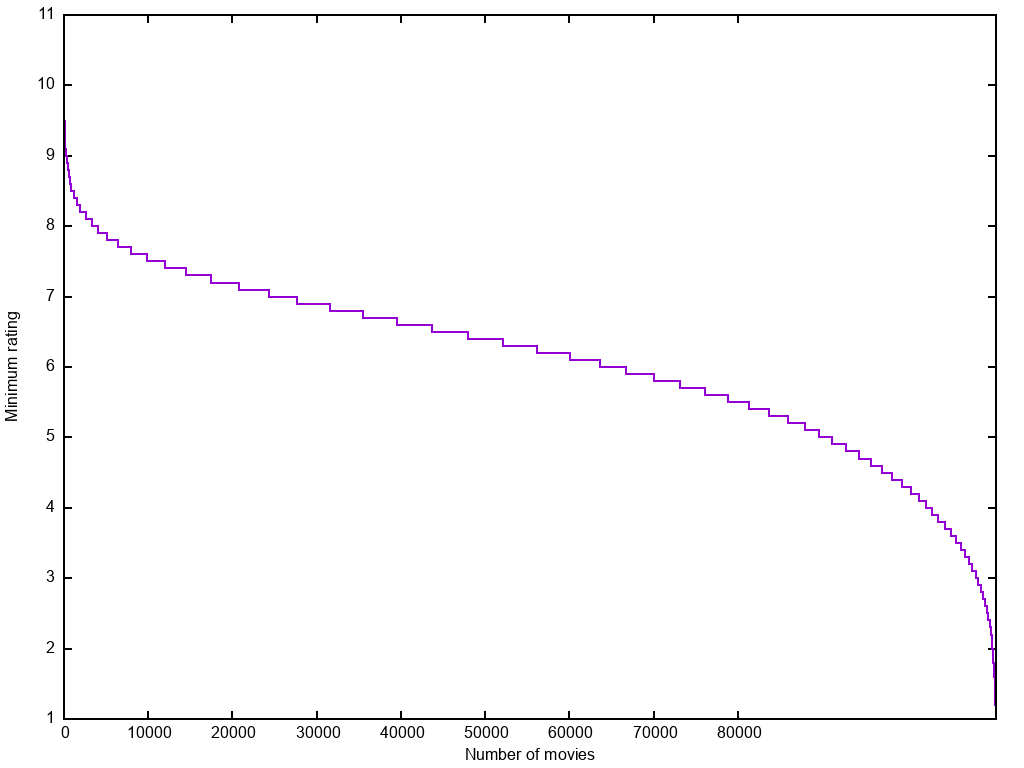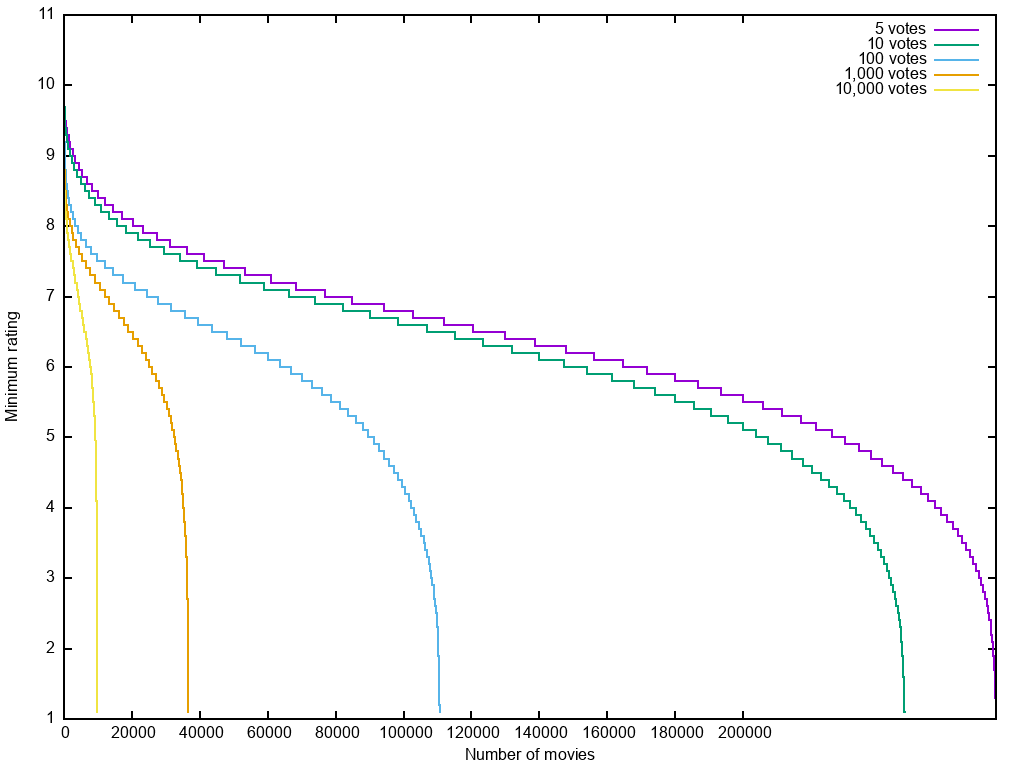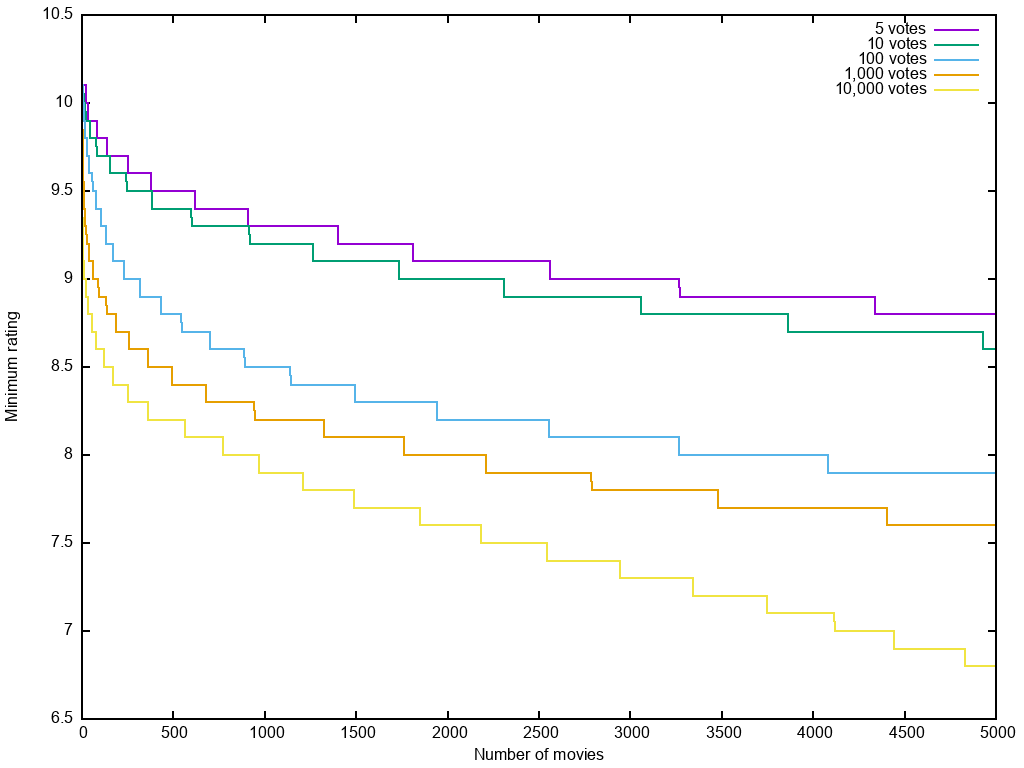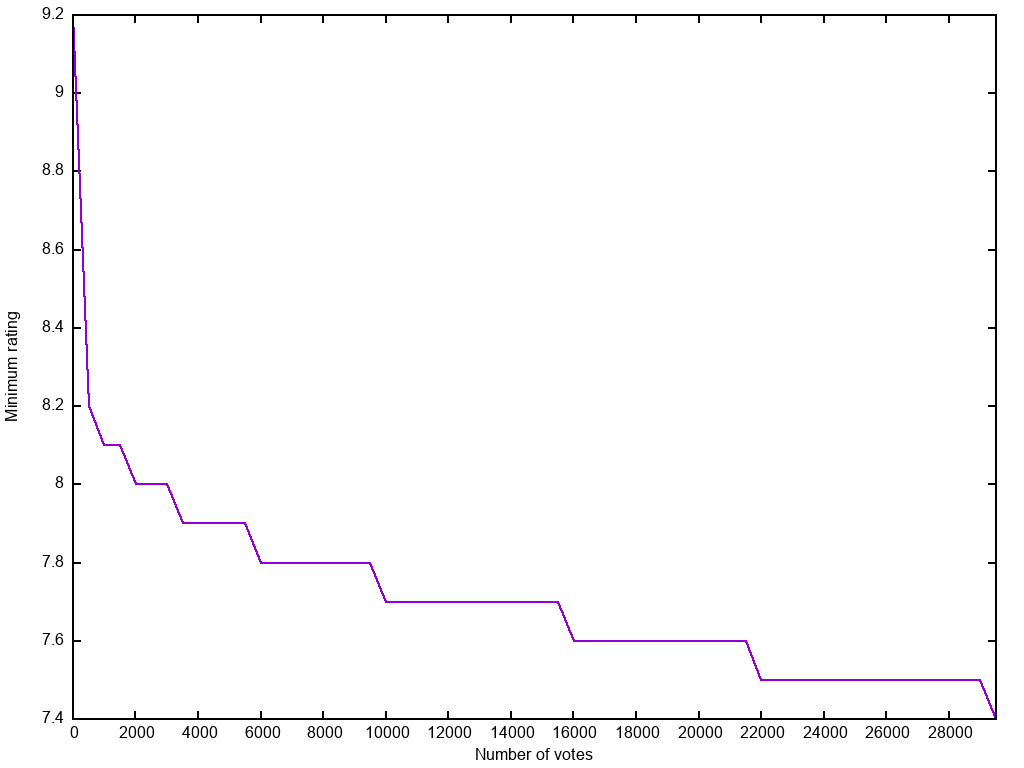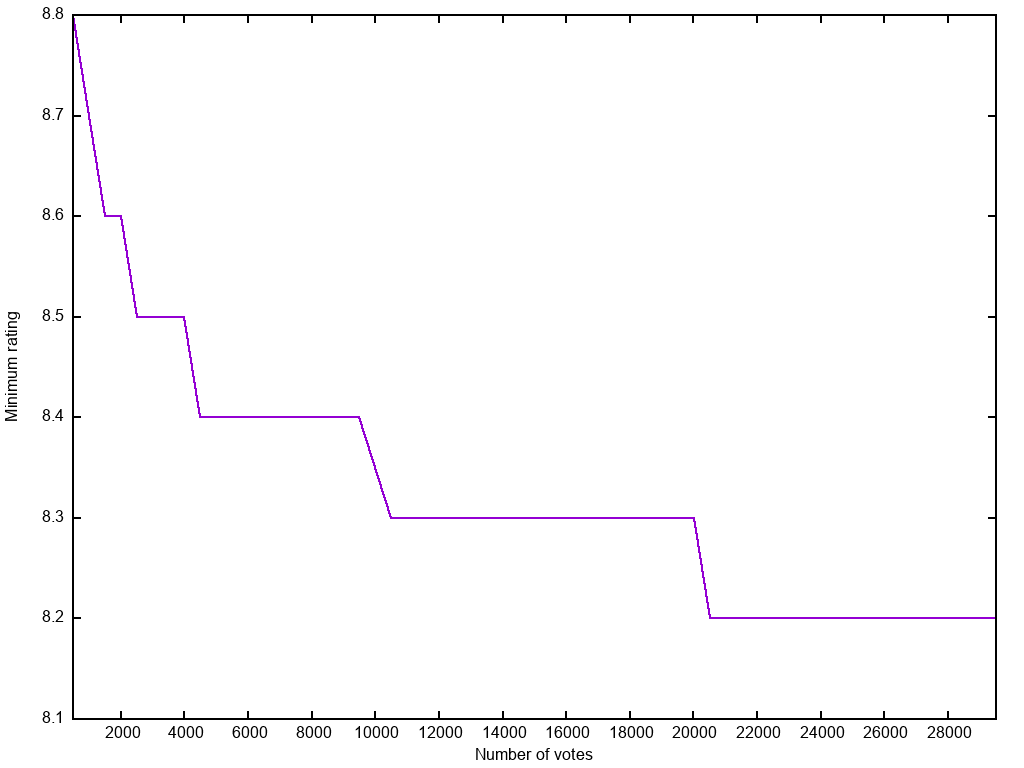What follows are some raw statistics and plots that I generated using imdb-stats, a small project written in Scala, gnuplot, and the IMDb dataset files. This is work in progress.
Note: I'm not a statistician (obviously).
As of December 21, 2017, there are 4,700,498 titles in the IMDb dataset files.
Title types
Titles can be partitioned into 10 different types:
- TV episode: 3,120,588 (66.39%)
- Short film: 596,395 (12.69%)
- Feature film: 471,950 (10.04%)
- Video: 189,542 (4.03%)
- TV series: 139,903 (2.98%)
- TV movie: 121,916 (2.59%)
- TV mini-series: 20,912 (0.44%)
- Video game: 20,707 (0.44%)
- TV special: 10,422 (0.22%)
- TV short: 8,163 (0.17%)
Years
4,430,900 titles (94.26%) have a start and/or end year defined:
- minimum: 1,874.00
- maximum: 2,115.00
- mean: 1,999.21
- median: 2,008.00
- mode: 2,016.00
- standard deviation: 22.40
The earliest title in IMDb is The Passage of Venus (1874). And, yes, 100 Years is planned for release in 2115!
Durations
1,445,426 titles (30.75%) have a runtime duration defined:
- minimum: 1.00
- maximum: 125,156.00
- mean: 46.79
- median: 30.00
- mode: 30.00
- standard deviation: 116.51
Most durations above 1,000 minutes are experimental videos, total durations for series, mistakes, etc.
Here are the statistics and frequency plot for feature films only:
- count: 292,149
- minimum: 1.00
- maximum: 14,400.00
- mean: 87.51
- median: 88.00
- mode: 90.00
- standard deviation: 53.54
For short films only:
- count: 388,272
- minimum: 1.00
- maximum: 1,834.00
- mean: 13.27
- median: 11.00
- mode: 10.00
- standard deviation: 10.04
There is some overlap between the short films and feature films. I'm not sure it totally makes sense (e.g. a feature film shorter than 10 minutes or a short film longer than 100 minutes?).
Ratings
789,386 titles (16.79%) have ratings.
- minimum: 1.00
- maximum: 10.00
- mean: 6.94
- median: 7.10
- mode: 7.20
- standard deviation: 1.39
Vote counts
Each title with a rating has at least 5 votes (this is a limit enforced by IMDb).
- minimum: 5.00
- maximum: 1,888,855.00
- mean: 993.63
- median: 20.00
- mode: 5.00
- standard deviation: 15,252.21
Most titles don't have much votes. The full frequency plot is not very useful:
If we zoom to 1,100 votes and less, we can see what's happening a little bit better:
95% of the titles with votes are in that area (i.e. about 1,100 votes and less):
- votes ≥ 10: 571,597 (72.41%)
- votes ≥ 100: 174,492 (22.10%)
- votes ≥ 1,000: 41,927 (5.31%)
- votes ≥ 10,000: 8,560 (1.08%)
- votes ≥ 100,000: 1,608 (0.20%)
- votes ≥ 1,000,000: 23 (0.00%)
Here is a list of the titles with more than 1,000,000 votes:
- 1,888,855 votes: The Shawshank Redemption
- 1,864,479 votes: The Dark Knight
- 1,653,332 votes: Inception
- 1,513,857 votes: Fight Club
- 1,477,384 votes: Pulp Fiction
- 1,425,693 votes: Forrest Gump
- 1,369,869 votes: The Lord of the Rings: The Fellowship of the Ring
- 1,358,735 votes: The Matrix
- 1,349,685 votes: The Lord of the Rings: The Return of the King
- 1,289,627 votes: The Godfather
- 1,269,450 votes: The Dark Knight Rises
- 1,269,062 votes: Game of Thrones
- 1,221,666 votes: The Lord of the Rings: The Two Towers
- 1,151,888 votes: Se7en
- 1,120,080 votes: Interstellar
- 1,095,691 votes: Gladiator
- 1,089,898 votes: Batman Begins
- 1,087,575 votes: Django Unchained
- 1,076,266 votes: The Avengers
- 1,044,290 votes: Breaking Bad
- 1,018,092 votes: Star Wars: Episode IV - A New Hope
- 1,006,010 votes: The Silence of the Lambs
- 1,004,376 votes: Inglourious Basterds
Most (but not all) of those titles are feature films. The mean/median numbers of votes for feature films are greater than the mean/median numbers of votes for all titles:
- minimum: 5.00
- maximum: 1,888,855.00
- mean: 3,108.20
- median: 44.00
- mode: 5.00
- standard deviation: 28,483.48
But the plot still doesn't look like a bell curve:
- votes ≥ 10: 176,223 (83.02%)
- votes ≥ 100: 77,743 (36.63%)
- votes ≥ 1,000: 25,560 (12.04%)
- votes ≥ 10,000: 7,250 (3.42%)
- votes ≥ 100,000: 1,504 (0.71%)
- votes ≥ 1,000,000: 21 (0.01%)
Minimum ratings
Question: what's the minimum IMDb rating for a feature film that you should watch if you can only watch N feature films in your life?
Here's the plot if you take into account all feature films with ratings:
If you take into account only feature films with 100 votes or more:
And now with 10,000 votes or more:
All the plots have the same shape: the more films you take, the less you have to be strict/conservative about the minimum rating. It makes complete sense.
If you put all the plots on the same image, it becomes clear in what way the minimum number of votes influences the minimum rating:
The higher the number of votes, the lower the number of feature films there are with that many votes. In other words, you can be less strict/conservative about the minimum rating with movies that have lots of votes.
But let's be honest, shall we? You probably won't see more than 5,000 feature films in your entire life, unless you're a movie buff. So let's zoom a little:
At this scale, if becomes clear that the minimum number of votes becomes less important: the minimum rating doesn't go all the way down to 1; actually, it doesn't even go below 7.5 for most plots and doesn't go below ~6.5 for all of them. It appears that it's probably a good idea to stay clear of feature films with a rating lower than 7 or 8, depending on the number of films.
Example 1. Let's say you only have the time to watch 1,500 feature films. These are the minimum ratings for various minimum number of votes:
- votes ≥ 5 ⇒ rating ≥ 9.20
- votes ≥ 10 ⇒ rating ≥ 9.00
- votes ≥ 100 ⇒ rating ≥ 8.20
- votes ≥ 1,000 ⇒ rating ≥ 8.10
- votes ≥ 10,000 ⇒ rating ≥ 7.70
- votes ≥ 25,000 ⇒ rating ≥ 7.30
- votes ≥ 100,000 ⇒ rating ≥ 4.70
Example 2. What about 250 feature films?
- votes ≥ 5 ⇒ rating ≥ 9.70
- votes ≥ 10 ⇒ rating ≥ 9.50
- votes ≥ 100 ⇒ rating ≥ 8.80
- votes ≥ 1,000 ⇒ rating ≥ 8.60
- votes ≥ 10,000 ⇒ rating ≥ 8.30
- votes ≥ 25,000 ⇒ rating ≥ 8.20
- votes ≥ 100,000 ⇒ rating ≥ 8.10
At the time of writing, all the movies in the IMDb Top 250 have more than 25,000 votes and a rating of 8.0 or more. If I had to guess, I would have given a minimum rating of 8.1 for a maximum of 250 movies to watch and a minimum of 25'000 votes. The discrepancy probably comes from the fact that "only votes from regular IMDb voters are considered when creating the top 250 out of the full voting database". I have no way of knowing which vote comes from "regular IMDb voters". This information is not included in the IMDb dataset files.
To-do
- check if there is a correlation between ratings and number of votes (plot + regression)
- check if there is a correlation between ratings and years (plot + regression)

